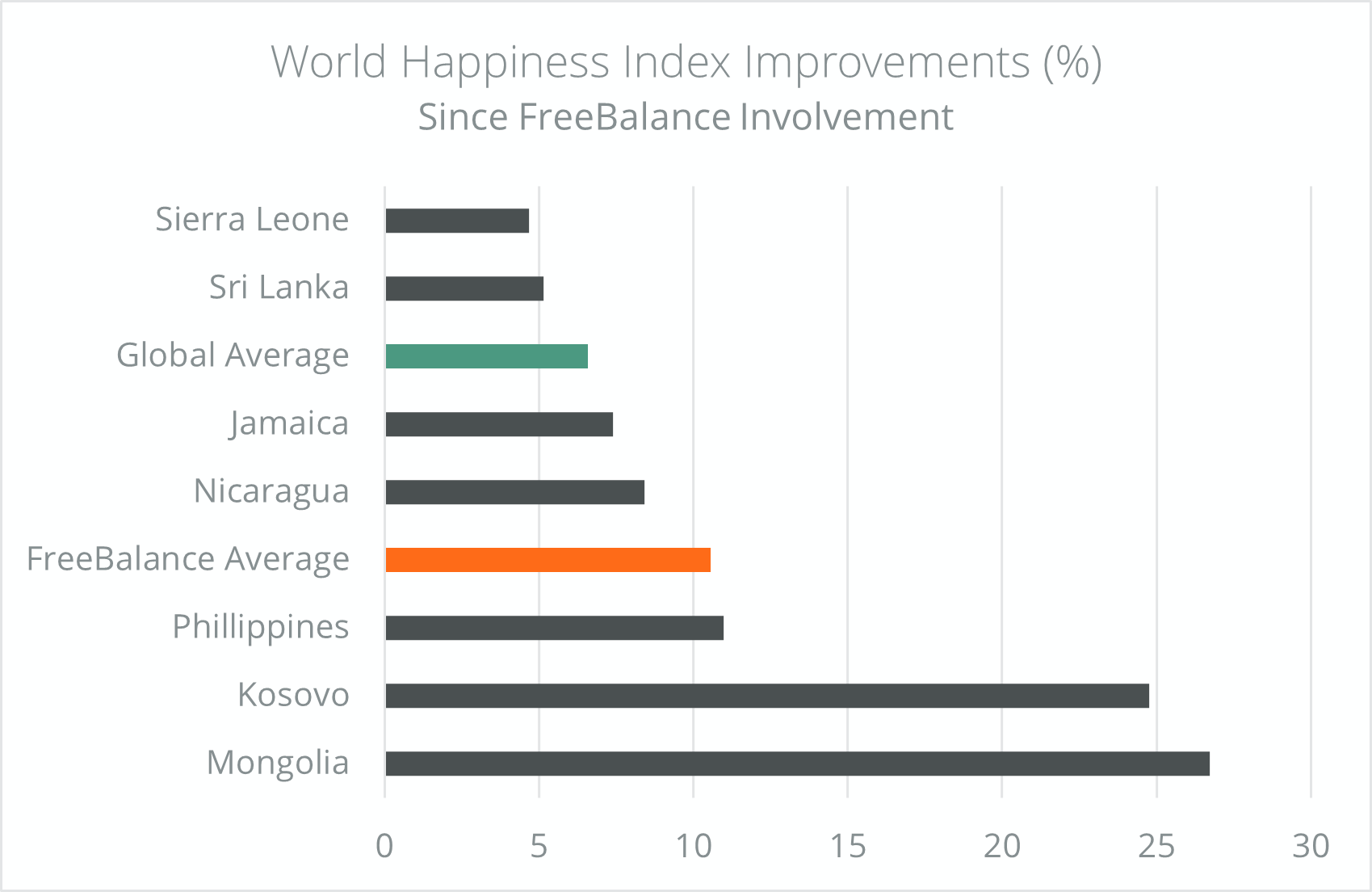The World Happiness Report 2023 provides interesting insights into the state of wellbeing across the world. One of the key factors highlighted in the report is perceptions of corruption, which is closely linked to Wellbeing and State Effectiveness.
Perceptions of corruption refer to the public’s view of the degree of corruption in their country’s institutions, including the government, judiciary, police, and public services. It is measured on a scale of 0 to 1, where a score of 1 indicates a perception of high corruption, and a score of 0 indicates a perception of low corruption. This is an important indicator as corruption is a major barrier to good governance, economic development, and social justice.
FreeBalance Customers Outperform the Global Average
The latest data in the report indicates that FreeBalance customers[1] improved their perceptions of corruption scores by an average 1.74% vs the global average improvement of 0.09%, indicating that the investments made in the FreeBalance Accountability Suite™, an integrated and unified Government Resource Planning (GRP) solution, have strengthened accountability and transparency mechanisms in these countries.

The perception of corruption can be defined as the belief that government officials and institutions are involved in illegal or unethical activities, such as embezzlement, bribery, nepotism, and favoritism. This perception can be shaped by various factors, such as personal experience, media coverage, cultural norms, and political discourse. While it may not always reflect the reality of corruption, it can have real consequences on people’s trust in government, their willingness to pay taxes, their access to public services, and their overall sense of security and dignity.
How Does the FreeBalance Accountability Suite™ Combat Corruption in Government?
The FreeBalance Accountability Suite™ is a Government Resource Planning (GRP) solution designed to promote transparency, accountability, and good governance in government organizations. By providing real-time access to financial information and automating key processes, the software helps to reduce the risk of corruption and fraud.
- Transparency: The software provides a transparent view of financial information, including budgets, expenditures, and revenue. This makes it easier for citizens to track how public funds are being spent, and helps to prevent government officials from hiding financial information.
- Accountability: The software automates many processes related to financial management, including budget planning, procurement, and payment processing. This reduces the risk of errors and ensures that all transactions are properly authorized and recorded.
- Auditability: The software maintains a detailed audit trail of all financial transactions, making it easier to detect and investigate any suspicious activity.
- Compliance: The unified controls within the software ensures that transactions are compliant with approved processes thereby making it difficult for users to commit fraud.

Link Between Corruption and State Effectiveness
Why is this important for state effectiveness? State effectiveness can be understood as the ability of a government to provide public goods and services, enforce laws and regulations, protect human rights, and respond to citizens’ needs and demands. Corruption undermines all of these functions by diverting resources away from public goods, distorting market competition, eroding public trust, and empowering the corrupt elite at the expense of the marginalized.
For example, if a government invests in infrastructure projects but the funds are siphoned off by corrupt officials, the projects may not be completed or may be of poor quality, leading to wastage of resources and dissatisfaction among the public. If a government awards contracts to politically connected firms rather than to the most qualified ones, the competition may be distorted and the public may end up paying more for lower-quality goods or services. If a government officials demand bribes for accessing basic services like healthcare or education, the poor may be excluded from these services and their human rights may be violated. Therefore, reducing corruption can improve the delivery of public goods and services, promote fair competition, and protect human rights.
Effect of Corruption on Citizen Wellbeing
Moreover, reducing corruption can also enhance citizen wellbeing which is defined as the subjective experience of life satisfaction, positive emotions, and meaningfulness. While it is influenced by various factors, such as income, health, education, social support, and culture, good governance can play a crucial role in shaping citizen wellbeing.
Indeed, corruption has a negative impact on citizen wellbeing by reducing trust, social capital, and happiness. According to studies, people who perceive corruption as a widespread problem are more likely to report lower levels of life satisfaction and happiness, even after controlling for other factors. This may be because corruption erodes social norms of reciprocity, trust, and cooperation, and creates a sense of injustice and helplessness. Moreover, corruption may worsen inequality by favoring the rich and powerful, and thus reducing social mobility and opportunities for upward mobility.
Therefore, reducing corruption can improve citizen wellbeing by increasing trust, social capital, and happiness. If people trust that their government is honest, fair, and accountable, they are more likely to participate in civic activities, obey laws, pay taxes and contribute to the common good. If people feel that their rights and interests are protected, they are more likely to pursue their goals, develop their talents, and enjoy their lives.
How GRP Solutions Enhance Citizen Wellbeing
Integrated and unified Public Financial Management (PFM) information systems such as FreeBalance’s GRP solution, the FreeBalance Accountability Suite™, play a critical role in improving governance, transparency, and accountability in government. The FreeBalance Accountability Suite™ is a comprehensive, commercial off-the-shelf (COTS) GRP solution that enables governments to monitor and manage public finances effectively. With its integrated modules for budgeting, accounting, procurement, revenue and treasury management, reporting and civil service management, the system provides a transparent and accountable system for managing public resources. By implementing such systems, governments can ensure that public funds are being used efficiently and effectively, which is crucial for enhancing citizen wellbeing.
The FreeBalance Accountability Suite™ is designed to promote good governance by providing real-time visibility into government financial transactions. This transparency allows citizens to hold their governments accountable and ensures that public officials are acting in the best interests of the people they serve. Additionally, the system’s robust reporting capabilities enable governments to identify areas of inefficiency and take corrective action to improve public service delivery, which ultimately results in improved citizen wellbeing.
Conclusion
In conclusion, perceptions of corruption have a significant impact on state effectiveness and citizen wellbeing. The World Happiness Report 2023 shows that FreeBalance customers have improved their perceptions of corruption over the past years, which has led to better state effectiveness and higher levels of citizen wellbeing. The use of integrated and unified Public Financial Management information systems, such as the FreeBalance Accountability Suite™, has played a crucial role in helping governments improve governance, transparency, and accountability. This, in turn, has resulted in a reduction in corruption and increased trust in government institutions among citizens.
Therefore, it is essential for governments to prioritize the implementation of such systems to achieve long-term sustainable development goals and to create a better future for their citizens. By ensuring transparent and accountable public financial management, governments can promote economic growth, reduce poverty, and ultimately enhance the overall wellbeing of their citizens. Governments must recognize that public trust is built on transparency and accountability, and the use of advanced technology can be a valuable tool to promote these values. The progress made by FreeBalance customers shows that it is possible to achieve a significant reduction in corruption, and this should serve as an inspiration for other governments to follow suit.
To speak to a Public Financial Management expert about how FreeBalance could help improve citizen wellbeing in your country, please get in touch.
[1] FreeBalance customers included in the survey that have whole-of-government implementations averaged over the period that the FreeBalance Accountability Suite™ has been operative
